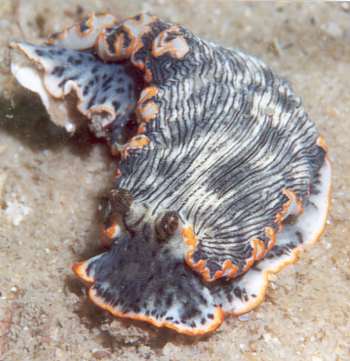Dermatobranchus nigropunctatus from east Australia
April 19, 2005
From: L. & D. Atkinson


Dear Bill,
We also found this Armina that we can not identify at Little Beach during a daytime dive but the viz was poor so the low light conditions could have been mistaken for dusk. We found two of these small creatures on a Gorgonian with yellow polyps that is common in the area. The current was running and it was difficult to get a clear shot on the gorgonia so we moved one to the sand to photograph it and then replaced it.
Locality: Little Beach, Marine Reserve, Port Stephens, NSW Australia.
Depth: 10 metres. Pacific Ocean. Length: 30 mm. 5 October 2004. Sandy bottom with scattered sponges & soft corals. Photographer: Leanne & David Atkinson
It is good to see the Forum continue. We very much appreciate your efforts.
Cheers,
Leanne & David Atkinson
atk@hunterlink.net.au
Atkinson, L. & D., 2005 (Apr 19) Dermatobranchus nigropunctatus from east Australia. [Message in] Sea Slug Forum. Australian Museum, Sydney. Available from http://www.seaslugforum.net/find/13515
Dear Leanne & David,
This seems to me to be Dermatobranchus nigropunctatus Baba 1949, which as the authorship suggests is known only from Japan. In Baba's description the colour pattern on the back consists of lines of small black spots on the mantle, which in you animals form black lines. All the other colour details are the same.
If I'm correct, then this is a new record for Australia. It doesn't necessarily suggest this species is a recent arrival, it more likely means that we haven't been looking hard enough. It's also possible that a couple of photos from South Africa I identified as D. cf. gonatophora [messages #2146, #2176] are possibly D. nigropunctatus as well, but the Sth African animals have black rhinophores with no trace of the orange found in Australian an Japanese specimens.
Best wishes,
Bill Rudman
Related messages
-
Dermatobranchus nigropunctatus from NSW, Australia
From: Jennifer Eaton, June 29, 2007
